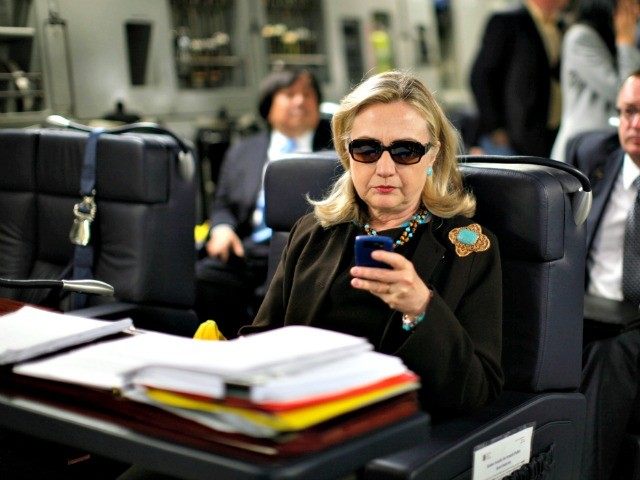The Federal Bureau of Investigation (FBI) is kicking its Hillary Clinton email investigation into high gear.
The Los Angeles Times reported Sunday that the FBI and federal prosecutors are setting up interviews with Clinton’s top aides, a group that presumably includes Huma Abedin and Cheryl Mills.
According to the Los Angeles Times:
Her attorney, David Kendall, declined to comment. Her campaign spokesman, Brian Fallon, said in an email that Clinton is ready to work with investigators to conclude the investigation.
‘She first offered last August to meet and answer any questions they might have,’ Fallon wrote. ‘She would welcome the opportunity to help them complete their work.’
Lawyers for her closest aides – Huma Abedin, Jake Sullivan, Cheryl Mills, and Philippe Renes – either did not respond to messages or declined to comment.
The case hinges on whether Clinton violated a provision of the Espionage Act of 1913.
The law (18 U.S. Code & 793 subsection f) makes clear that anyone who has materials “relating to the national defense” cannot lose or give them away. The law is broken if “through gross negligence permits [materials] to be removed from its proper place of custody or delivered to anyone in violation of his trust, or to be lost, stolen, abstracted, or destroyed.”
The penalty? A fine, a prison term of up to ten years, or “both.”
Clinton used a non-secure BlackBerry to conduct classified State Department business, and there’s evidence that her device was compromised on her very first official trip to China as Secretary of State.
On March 11, 2009, a State Department official whose name is redacted sent an email to another State Department official whose name is redacted. That email, obtained in a lawsuit by Judicial Watch, just might be the smoking gun in the Hillary Clinton email case.
The official stated that Hillary Clinton approached Boswell and asked him about Blackberry use. Specifically, Clinton asked about the fact that the Department had “intelligence concerning the vulnerability during her recent trip to Asia.”
The official wrote:
After this mornings “management meeting” with the A/Secys, Secretary Clinton approached Ambassador Boswell and mentioned that she had read the IM and that she “gets it”. Her attention was drawn to the sentence that indicates we (DS) have intelligence concerning this vulnerability during her recent trip to Asia.
Secretary Clinton has asked Ambassador Boswell for this information. Please prepare a short informal paper OR provide the A/Secy with a briefing on this matter. Your assistance is appreciated. The Secretary did not provide a “due date”…BUT the Ambassador would like to close this loop as soon as possible.
Since the FBI seized Clinton’s emails in August, the scandal has haunted her campaign.
Senior White House adviser Valerie Jarrett threw Clinton under the bus, saying that the White House provided guidance to the State Department, telling employees to use official government email accounts.
Breitbart News first reported, based on high-level government sources, that of seven emails originally being analyzed by investigators to determine their classification status, two were deemed “Top Secret” and at least two were already classified when they were sent. Meaning, Clinton was sending and receiving classified information that she knew to be classified. The classifications were made by the Central Intelligence Agency (CIA).
Our exclusive report galvanized our readers and other media outlets, quickly picking up more than 12,000 social media shares and 5,000 comments. The Clinton campaign could not find a suitable talking point on the issue. The campaign tried to claim that Clinton did not send emails that were classified “when originated.”
But Intelligence Community C, now under attack by Team Clinton, confirmed, “IC classification officials reviewed two additional emails and judged that they contained classified State Department information when originated.”
The inspector general went on to make a comprehensive report, filed earlier this month. He found that “several dozen” emails had classified information in them. “These declarations cover several dozen emails containing classified information determined… to be at the confidential, secret and top secret/sap levels,” McCollough wrote in a letter to Congress. That’s right. A “sap” level is an even higher classification status than “top secret.”
Clinton’s server was highly vulnerable to attack, like the kind that occurred to multiple of her email contractors and could have happened to her when she opened a virus-infected email from her friend.
Breitbart News reported that Clinton’s server was operating on the same email network, and was housed in the same exact physical space, as the server for the Clinton Foundation, indicating that they were sharing a server. Additionally, that space was in New York City, not in the basement of Clinton’s Chappaqua, New York, home, as she claimed. Daughter Chelsea Clinton’s office was also using the email network.
Numerous Clinton Foundation employees used the clintonemail.com server for their own email addresses, which means that they were using email accounts that, if hacked, would have given any hacker complete access to Hillary Clinton’s State Department emails, as well.
Clinton’s server had an open webmail portal that gave potential hackers unrestricted access to Clinton’s personal information.
In fact, Clinton’s server went down at least three times during her tenure as Secretary of State, including weeks after the Benghazi terrorist attack. Clinton never even told her own IT Help Desk at the State Department that she was using a private server, keeping them in the dark about her secret activities.
Clinton even went so far as to hide the identity of the people running her private server, paying a company called Perfect Privacy, LLC. That company, based in Jacksonville, enters its own meaningless contact information into official Internet databases so that its clients’ identities will not be exposed.

COMMENTS
Please let us know if you're having issues with commenting.